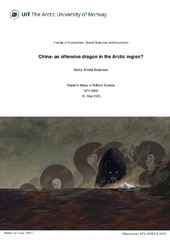China- An offensive dragon in the Arctic region?
Forfatter
Andersen, Astrid AlmlidSammendrag
The geopolitical picture in the world is changing. Russian aggression has brought Europe into war, the USA is turning its global focus making great political changes, and the People’s Republic of China is chasing super power status, pivoting the worlds power gravity towards the East. In this picture we find Norway, barely a speck on the world map in the Arctic region and seemingly away from it all, yet in a region that now appears to have become increasingly relevant globally. With climate changes and global warming allowing us more access to the Arctic, questions and curiosity rises to its potentials and value globally, piquing the interest of not only the Arctic states, but also other states and actors worldwide, including China. Opening the Arctic stage will undoubtedly change the power dynamics in the region, possibly allowing the geopolitics to play a much larger role than it has been allowed before. The increased tension globally has put security back up top on the political agenda and the great powers are making their moves, positioning themselves trying to get a better vantage point. This tension appears to have spread to the Arctic region, with the United States now threatening to take over Greenland, Chinese attempts to establish a foothold through national incentives and greater cooperation with Russia, and Russia fighting a war in Ukraine trying to strengthen its power position in Europe. In a world where bears, tigers and falcons dominate, how can a small state such as Norway survive?
In this paper I am going to have a look at how Norway as a small state can manoeuvre in the great power landscape in the Arctic region, with specific focus on China as an emerging actor and the effects of the emerging Sino- Russian cooperation in the region. I have applied the theoretical framework of offensive realism and small- state theory to better understand Norway’s position as a small state and China’s as a rising superpower and to some extent how we can expect them to behave in the Arctic. My primary focus will be on the Norwegian Arctic strategy with regards to China and I argue that Norway faces a possible dilemma between its own interests in possible cooperation with China and pressure from its allies to take a more critical line of politics on China. The aim is to prove or disprove this position and to try and outline a suggested model for the Norwegian Arctic Policy on China. That includes to identify the existing Chinese and Norwegian Arctic policies and interests, to assess the strategic importance of the region itself and describe how the other major Arctic actors affect the Norwegian policy making, and lastly to describe and discuss the possibilities, factors, and possible dilemmas Norway as a small state should consider when shaping its Arctic strategy for China.
Forlag
UiT The Arctic University of NorwayMetadata
Vis full innførselSamlinger
Copyright 2025 The Author(s)


 English
English norsk
norsk
